We can agree that coughing and chest congestion are two of the absolute worst cold symptoms to deal with. It can be distracting, uncomfortable, and downright painful sometimes! Most of us would probably reach for an over-the-counter medication to take care of these common symptoms of bronchitis, but relief may also be found naturally in your essential oil toolkit!
Of course, if your symptoms do not improve or get worse, you should see your doctor as soon as possible. Coughs and chest congestion can be a simple fix or an indication of a much more severe problem, so it is best to make sure you nip it in the bud!

Assuming that everything is all good and you’re just dealing with some uncomplicated bronchitis, we’ll show you some ways that essential oils can provide natural relief that is comparable to and maybe even better than over-the-counter remedies.
We’ll share some essential oils that can act as expectorants and cough suppressants, then share some of the best essential oils for bronchitis, cough, and chest congestion.
We’ll also go into essential oils that can potentially help with the underlying causes of bronchitis, as well as some methods for leveraging essential oils for bronchitis symptoms. We will finish up by sharing the best essential oils and essential oil blends for bronchitis.
Table of Contents
What is Bronchitis?
Bronchitis is when the bronchial tubes, which are the tubes in your lungs, get inflamed due to an infection. There are two types of bronchitis: acute and chronic.
Acute Bronchitis
Acute bronchitis, which is also referred to as a chest cold. Symptoms of acute bronchitis usually improve within a week. Although, some people can have a lingering cough for weeks after infection.
Chronic Bronchitis
Chronic bronchitis is when you continue to have a productive cough that can last months after infection. It is vital to see a health professional if you think that you have this condition.
What is an Expectorant?
First things first, what is an expectorant, and how is it related to bronchitis?
Merriam Webster’s dictionary defines an expectorant as:
“an agent that promotes the discharge or expulsion of mucus from the respiratory tract”.
Merriam Webster
This definition sounds very unpleasant, but it does mean that it can help you get rid of all of that nasty stuff that’s hanging out in your lungs and making you uncomfortable.
Expectorants work by thinning out the mucus that is sitting in your airways so that coughs are more productive and remove more mucus, which theoretically quiets coughing.
This doesn’t work for everyone, though, and the side effects can cause further discomfort like nausea and vomiting. If you do choose to go this route, we have some recommendations!
Best Essential Oils for Bronchitis
Eucalyptus
Eucalyptus essential oil is hands down one of the best essential oil expectorants that can help you with your toughest cough symptoms.
The primary chemical compound that makes eucalyptus an effective expectorant is cineole. Cineole is a terpenoid that occurs naturally in eucalyptus and is considered to be a strong expectorant, anti-inflammatory, and immune stimulant.
Essential Oil Recommendation
The reason we love this eucalyptus oil from Edens Garden is that it not only is great for diffusing but also for making homemade vapor rubs.
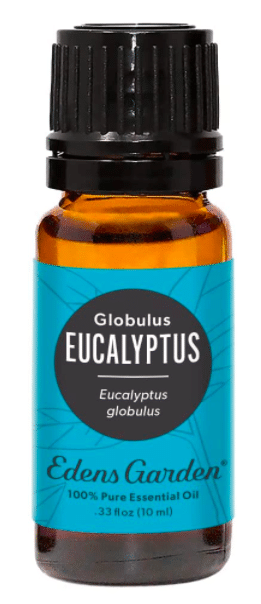
In fact, this variety of eucalyptus is most commonly used in most vapor rub products sold in stores.
How to Use
Eucalyptus essential oil can be used as an expectorant for coughs by diffusing five drops of the oil at home. Right before bed is the best time to do this because it can help you sleep easier.
To make your own homemade vapor rub, mix olive oil, coconut oil, a few drops of peppermint oil, and eucalyptus oil to experience the expectorant benefits of this essential oil.
Precautions
If you do plan on using eucalyptus topically, keep in mind that it should not be used on children under two years of age.
Also, it is important to note is that there have been reported adverse skin reactions to eucalyptus essential oil, so be sure to dilute this oil with a carrier oil and do a small patch test before slathering it all over your chest -especially if you are new to this oil or just have sensitive skin.
Rosemary
Rosemary essential oil has been shown to relax the smooth muscles that are found in the trachea, which can help suppress frustrating coughing. Similar to eucalyptus essential oil, rosemary essential oil also contains the terpene cineole! This terpene, combined with rosemary’s relaxing effect on your tracheal muscles, makes it a fantastic choice for relieving symptoms.
In one study featuring the tremendous benefits of cineole, all of the patients in the treatment group experienced reductions in their bronchitis symptoms.
Another great attribute about rosemary is that it shows both antioxidant and antimicrobial properties as well as acts as a natural immune booster.
In fact, in one study, inhaling an essential oil blend of eucalyptus, peppermint, oregano, and rosemary essential oils were shown to improve the symptoms of the test group within 20 minutes of it being used! We’ll touch on some of those other oils later, but we already know about how great eucalyptus and rosemary can be for bronchitis.
Essential Oil Recommendation
The rosemary essential oil from Cliganic is a popular choice among many avid essential oil users.
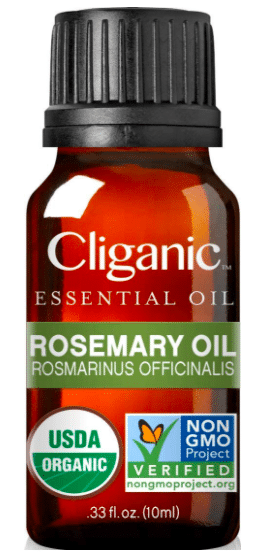
It’s has a clean and earthy scent, and it is an affordable oil that is also organic.
How to Use
If you reach for rosemary the next time you have chest congestion, add about five drops in your diffuser or combine two drops with half a teaspoon of coconut oil, and you then massage it into your chest.
Precautions
This essential oil may not be safe for women who are pregnant and children under the age of 4.
Additionally, make sure to always dilute and patch test your topical essential oil mixtures to ensure that you do not have an adverse reaction.
Peppermint
Peppermint essential oil is terrific for coughs because it contains menthol and has antibacterial and antiviral properties. Menthol is helpful because it has a cooling effect on your chest and can improve airflow by unclogging your sinuses when you are congested.
Peppermint can additionally help to relieve a sore throat that might be making you cough in addition to bronchitis. It has been shown to have some anti-cough and antispasmodic effects as well, which means that it can keep your chest from getting irritated and causing coughs.
Peppermint essential oil is even used by athletes to enhance their athletic performance because it can also help relax smooth muscle and increase oxygen flow. These two factors coincidentally help relieve cough symptoms and irritation caused by bronchitis.
Essential Oil Recommendation
Our favorite peppermint oil is from NOW Foods. It has a very invigorating and fresh scent; perfect for clearing out those sinuses!
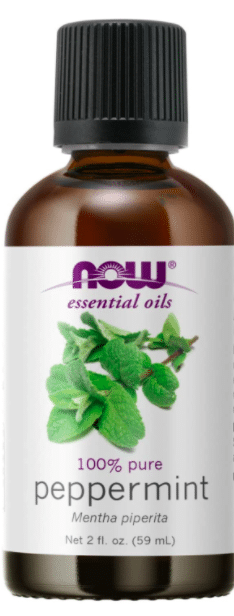
Many essential oil users also love to use this oil to keep insects and rodents away!
How to Use
There are many ways to utilize peppermint for coughing or bronchitis. One of the best ways to use it for these conditions is to put five drops of peppermint oil in your favorite diffuser or inhale it directly from the bottle.
Precautions
Take caution when using this because it can cause eye irritation, so make sure that you wash your hands after using this oil. It is also important to note that this essential oil should not be used on children under the age of 2.
Lemon
Lemon essential oil has been considered an immune-boosting oil by many essential oil users, and this belief isn’t based on anecdotal evidence!
Research has shown that lemon essential oil has antibacterial, antispasmodic, and anti-inflammatory properties. These three functions are beneficial if you are dealing with bronchitis.
Essential Oil Recommendation
The lemon oil from Edens Garden is, as always, high quality and affordable. The scent of this oil is very fresh and uplifting.
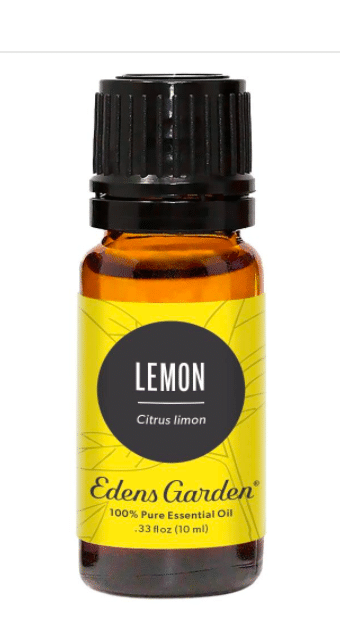
Additionally, many essential oil users love to use this oil in their skincare routine!
How to Use
For relieving a cough, diffuse five drops of lemon oil with 2 drops of peppermint oil in your diffuser.
Oregano
Oregano essential oil is another oil that may help with the symptoms of bronchitis. Oregano oil has known antimicrobial properties, but it also has other properties that make it a great oil for infections.
Oregano essential oil contains the terpenes thymol and carvacrol; research has shown that these terpenes have anti-inflammatory properties that aid in infections, such as bronchitis.
Oregano also exhibits possible antiviral activity, which makes it even more relevant to use for a condition like bronchitis since a virus usually causes bronchitis.
Essential Oil Recommendation
Edens Garden oregano oil is divine. The scent notes are earthy, sweet, and peppery.
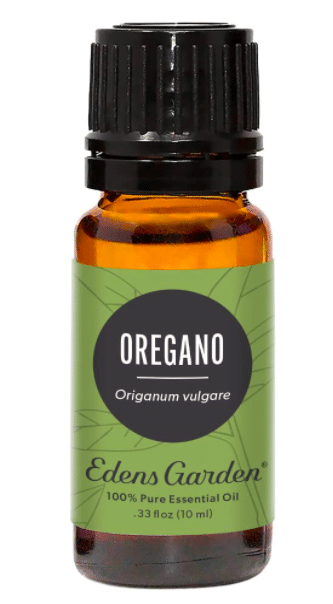
This is a great quality oil that can be used for diffusing and applying topically for various health benefits.
How to Use
To use oregano oil for your cough, diffuse 3-5 drops in your diffuser of choice. You can also combine 2-3 drops of oregano with equal parts carrier oil such as jojoba or coconut oil for added antimicrobial benefits and apply it to your chest, back, neck, or bottom of your feet.
Tea Tree
The final top essential oil that can help us out with coughing, chest congestion, and other pesky symptoms of bronchitis is tea tree essential oil.
Tea tree is commonly known as an antimicrobial essential oil. Research is abundant, but it is still not clear precisely what components of the tea tree oil make it a powerful antibiotic. Tea tree is also potentially antiviral, so it may be able to treat the root cause of bronchitis and other respiratory infections. There is not much research that confirms the antiviral qualities of tea tree, but it can still help prevent further infection by being antibacterial.
The refreshing scent of tea tree essential oil may also be helpful when you are dealing with some clogged sinuses or coughing. Like peppermint, its strong smell may be able to open up airways, making it perfect for helping out with these respiratory conditions.
Essential Oil Recommendation
We love the organic tea tree oil from Plant Therapy because of the potency of this oil; you only need about two to three drops to really experience this oil!
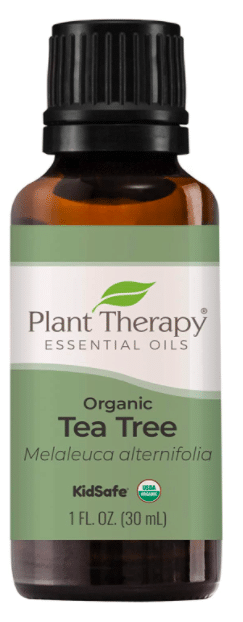
Many essential oil users love to use this oil topically for acne, chest congestion, and even toenail fungus!
How to Use
If you want to give tea tree a try for your cough, try to diffuse five drops in your favorite diffuser, inhale it directly from the bottle, or dilute 1–2 drops with a half teaspoon of your favorite carrier oil and massage it into your chest and back of your neck.
Precautions
Please make sure to dilute this oil with a carrier oil and do a patch test before using tea tree oil on your skin because some individuals have experienced adverse reactions when using this essential oil.
Humidifier for Bronchitis
Sometimes dry air is not helpful when we are already dealing with excessive coughing from bronchitis. There are specific essential oil diffusers such as ultrasonic diffusers that can assist with adding moisture to the air in addition to the healing benefits of your essential oils.
Try this diffuser!
This essential oil diffuser has great reviews on Amazon and is an ultrasonic diffuser so it adds humidity to the air as well. This diffuser not only looks classy, but it also has several different mist modes so you can regulate how much moisture you want to put into the air. It also has an auto shut-off feature and LED lights, making it the perfect addition to your decor as well as a way to diffuse healing essential oils into the air.
Essential Oil Blends
Essential Oil Blend for a Cough
Our favorite blend for a dry cough is a blend of peppermint , eucalyptus , lemon , and basil .
Add 3-5 drops of each of these oils are used and mixed in with your favorite carrier oil to make a chest rub. Apply as needed to relieve chest congestion and suppress a cough.
Essential Oil Blend for Nasal Congestion
Our favorite essential oil blend for nasal congestion is a blend of peppermint , lemon , oregano , and melaleuca oils. Add 2-3 drops of each of these oils into your diffuser to relieve nasal congestion.
